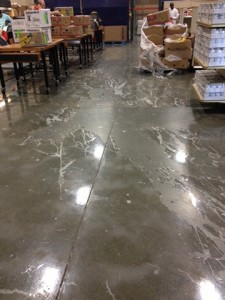Cleaning and sealing a concrete floor may seem like a simple task to hire done for a reasonable price. But there is more to choosing a sealer for concrete floors than you may think…and the prices, they may vary quite drastically.

Concrete floor sealers can fail instantly or over time if you do not chose the right sealer for the job.
How to Understand the Right Sealer for Concrete Floors so That You Don’t Have a Total Failure:
1. Type of Facility: When looking for a sealer for concrete floors, it is important to know what type of traffic it will sustain. Foot traffic only or heavy forklift or other wheeled traffic? If the facility is a warehouse or manufacturing plant, topical sealers like epoxies, are not necessarily suitable. Eventually, they will wear off and require replacement. Unless there is a chemical resistance needed, topical sealers are not a long-term option for the concrete slab.
2. Type of Sealer: In addition to topical sealers mentioned above such as urethanes, epoxies, and other paints or coatings, there are penetrating sealers. Penetrating sealers are commonly used in large facilities and do no wear off. Though it is a more permanent solution, this option loses cleanability as the concrete is still porous. Is there a sealer for concrete floors that offers both longevity and cleanability?
3. Installation Process: For both topical concrete sealants and penetrating sealers, the installation process is extremely important. Failure to properly install sealer for concrete floors may result in immediate failure or premature failure. A good bond is the most important thing for topical concrete floor sealers. Thoroughly removing all the surface contaminates and creating surface abrasion (or grip) for the coating will ensure a good bond…but did the contractor test for moisture? If moisture vapor transmission is present, it can push up salts from the concrete that will cause the coating to blister. Using a penetrating sealer coupled with polished concrete is one way to eliminate the need for proper surface prep and moisture testing. A polished concrete floor remains breathable (for moisture) and seals itself through a refinement process.
Titus Restoration is specialized in providing the right sealer for concrete floors based on your needs. Contact our team for more information on what is right for your facility.
